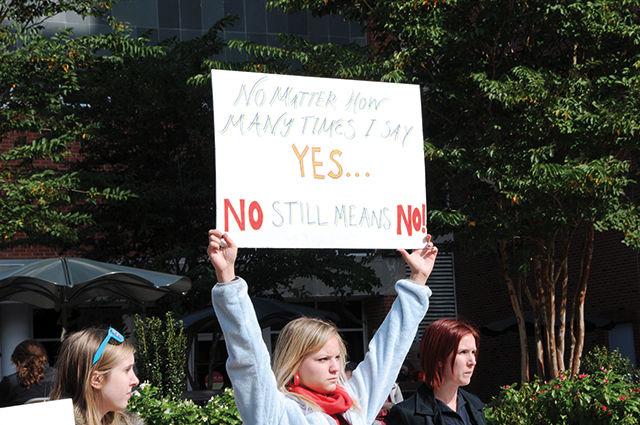 " />
" />
Susan Youngstead, junior in psychology, holds a sign during the SlutWalk on Nov. 2, 2012. "The purpose was to raise awareness of victim-blaming here at N. C. State because this is an issue that many people don't realize affects people all around us," Youngsteadt said.
Sexual violence cannot be explained away or excused on the basis of clothing—that’s the driving force behind NC State’s first large-scale SlutWalk sponsored by The Movement and the Women’s Center.
The SlutWalk, which will take place Thursday at 5 p.m. on Stafford Commons, aims to call attention to rape culture, sexual harassment and body shaming.
Sara Forcella, the rape prevention education coordinator with the Women’s Center, hopes the walk will help facilitate a culture that is more supportive of survivors of sexual violence.
“We want to draw attention to the causal usage of the word slut,” Forcella said. “We want to reclaim that word and words like it. We also want to be a campus that supports survivors of sexual assault and create a campus where survivors are able to come out, get resources, get support and not feel blamed or shamed by faculty, staff, peers or anybody else in the campus community.”
The event will begin with performances by the Arts Village, spoken word and poetry reads, all which will highlight the various facets and intersectionality of sexual violence and victim blaming. Participants will then have the opportunity to join in on a short, handicap-accessible march through campus.
A number of groups on campus, including the Women’s Center, GLBT Center and Students Advocating Gender Equality, will have tables set up before and after the walk to provide students with information regarding sexual assault prevention and the resources available to survivors of sexual violence.
“We want to demonstrate that victim blaming affects all communities,” said Maggie Schroder, the SlutWalk’s planning committee president and a sophomore studying social work. “These groups are here to help survivors, and we have just been really blown away by their support and by the support that we have gotten from students.”
SlutWalks originated in Toronto, Canada, in 2011 after a Toronto police officer suggested that women avoid dressing like sluts as a precaution against sexual violence.
“This is a transnational movement,” Forcella said. “It wasn’t our idea. Our intention has never been to offend anybody. Instead, we wanted to align ourselves with the national SlutWalk movement and make our walk more intersectional and focus on the students on our campus.”
Schroder said this strong display of the word slut is the first step toward reclaiming the word.
“[Slut] is a very strong word, and it has a lot of meaning behind it, so I totally understand why some people might feel uncomfortable,” Schroder said. “But it’s this uncomfortable feeling that is the beginning of people learning about why we can’t throw this word around as much as we do.”
Schroder estimates there will be more than 300 students present at tomorrow’s walk. And while SlutWalk participants generally wear clothing that has been deemed “slutty” by popular culture, Schroder encourages students to wear attire that makes them feel comfortable.
“This SlutWalk is going to be a really positive and educational event,” Schroder said. “It is going to show everyone that sexual assault is never OK, no matter where you were, what you were wearing or what you had to drink.”
More information regarding tomorrow’s event can be found on the walk’s Facebook page, SlutWalk: A Walk to End Victim Blaming.